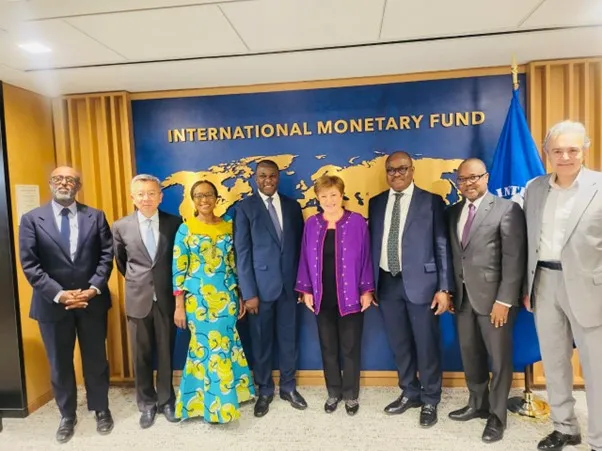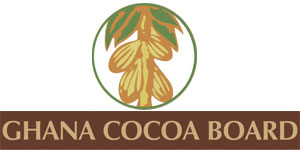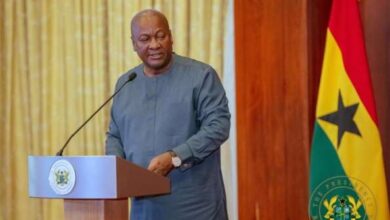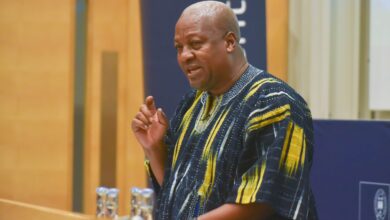Ghana’s Investment Landscape Boosted by Positive Feedback at IMF-World Bank Meeting
Ghana's Investment Landscape Boosted by Positive Feedback at IMF-World Bank Meeting

- Ghana's investment landscape has received a notable boost
- The positive reception at the IMF-World Bank meetings follows Ghana's recent staff-level agreement
- The minister hinted at plans to release detailed reports
Ghana’s investment landscape has received a notable boost following positive feedback from international investors and development partners during the recent International Monetary Fund (IMF) and World Bank Annual Meetings in Washington, D.C., according to Finance Minister Dr. Mohammed Amin Adam.
In a press briefing after the meetings, Dr. Adam, who led the nation’s delegation, reported that Ghana’s economic reforms and successful debt restructuring efforts have gained widespread recognition within the international investment community.
“The sentiment towards Ghana has been overwhelmingly positive, especially during our discussions with institutional investors and major corporations,” he stated.
Dr. Adam highlighted that Ghana’s commitment to fiscal discipline and the effective implementation of its IMF program has restored confidence in the country’s economic outlook.
The meetings featured investor roundtables co-hosted by leading financial institutions such as JP Morgan and Stanbic Bank, alongside mining giant Newmont and the Business Council for International Understanding (BCIU), providing a platform for Ghana to showcase its economic achievements.
The Minister noted that Ghana’s adherence to its three-year IMF program has been essential in rebuilding investor trust. “Our partners have praised Ghana’s strong economic performance over the past year, particularly our successful debt restructuring and compliance with IMF benchmarks,” he added.
The delegation engaged with various institutional investors who showed interest in increasing their involvement in Ghana’s economy. “We have received clear signals from investors eager to expand their operations here. The government is ready to facilitate these investments while fostering a business-friendly environment,” Dr. Adam remarked.
Addressing concerns about potential fiscal pressures during the upcoming election period, he reassured that the government remains committed to maintaining fiscal discipline. “We are aware of the historical trend of election-year spending pressures, but this administration is dedicated to our current fiscal strategy,” he said, emphasizing the importance of long-term debt sustainability and a stable macroeconomic environment.
The positive reception at the IMF-World Bank meetings follows Ghana’s recent staff-level agreement on the third review of its IMF program, marking a significant step in the nation’s economic recovery efforts.
“Our doors are open for business. We are committed to upholding the reforms that have brought us this far and creating an even more attractive investment climate for both domestic and international investors,” he affirmed.
The finance ministry also indicated that several follow-up meetings with potential investors are planned for the coming months to capitalize on renewed international confidence in Ghana’s economy.
Additionally, the minister and his team secured a $260 million funding package from the World Bank, which includes $250 million in credit and a $10 million grant.
This marks Ghana’s first energy partnership with the World Bank in over 20 years and will support the Energy Sector Recovery Programme for Results (P4R), aimed at enhancing financial sustainability in the country’s electricity distribution sector and increasing access to clean cooking solutions.
This initiative addresses critical issues like high distribution losses and low revenue collection rates, which have cost an estimated 2% of GDP annually. The program aims to strengthen the financial performance of the energy sector and create a more sustainable future.
Ghana recently achieved a major milestone in economic recovery, achieving 98.6% participation in the restructuring of $13 billion in Eurobond debt. New investors received $9.4 billion in new bonds in exchange for their old ones, with holders given two options: the DISCO or PAR choice. DISCO investors accepted a 37% reduction in value, while PAR investors received a 1.5% bond due in 2037 without value reduction.
Additionally, all investors received zero-coupon bonds maturing in 2026 and 2030 to cover missed interest payments from December 2022 through 2023. This restructuring also includes $5.1 billion in bilateral loans and GH¢203.4 billion in domestic debt.
As a result, rating agencies Moody’s and Fitch have reassessed Ghana’s debt instruments positively.
The minister hinted at plans to release detailed reports on specific investment commitments and economic targets in the coming weeks as the country continues its pursuit of medium-term development objectives while maintaining fiscal stability.





